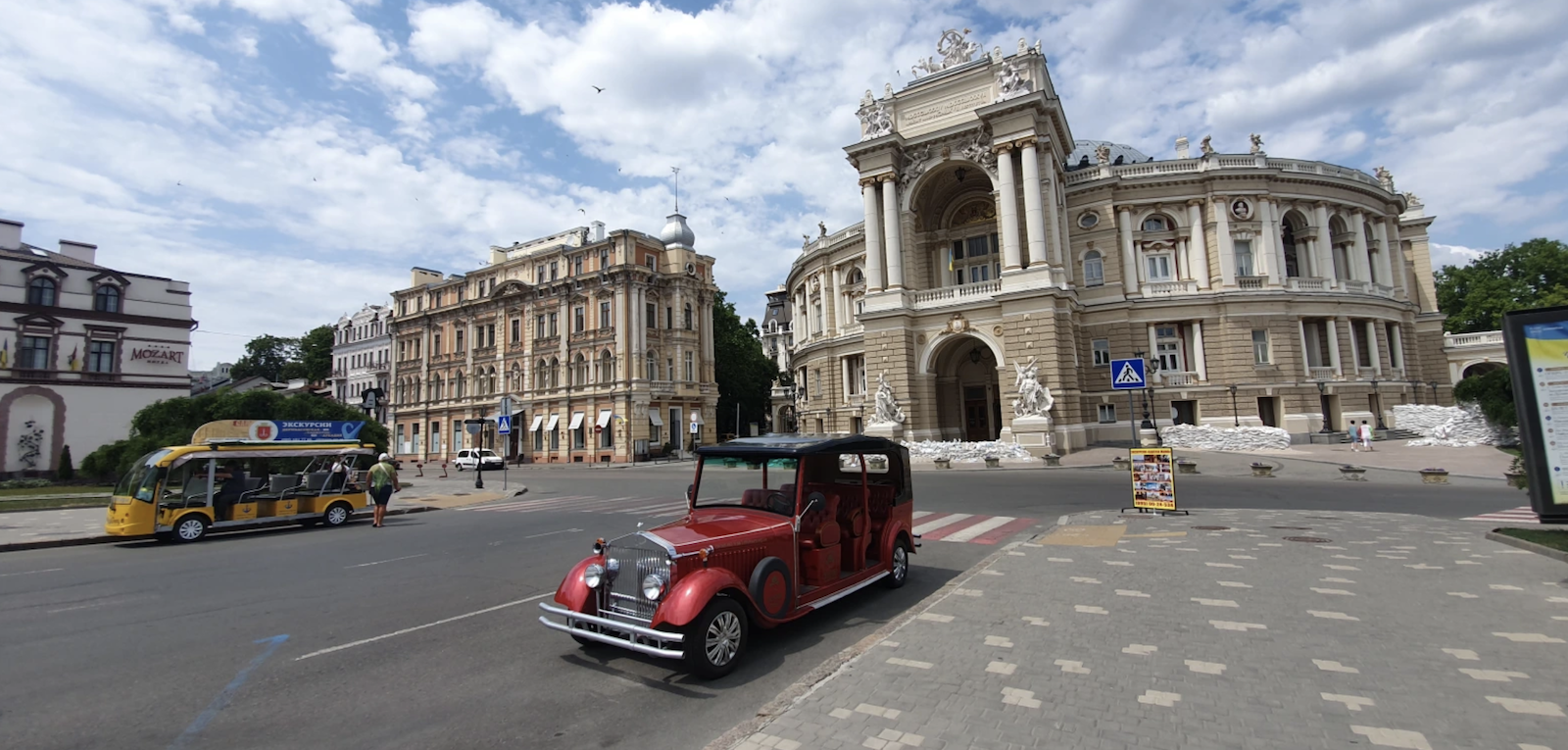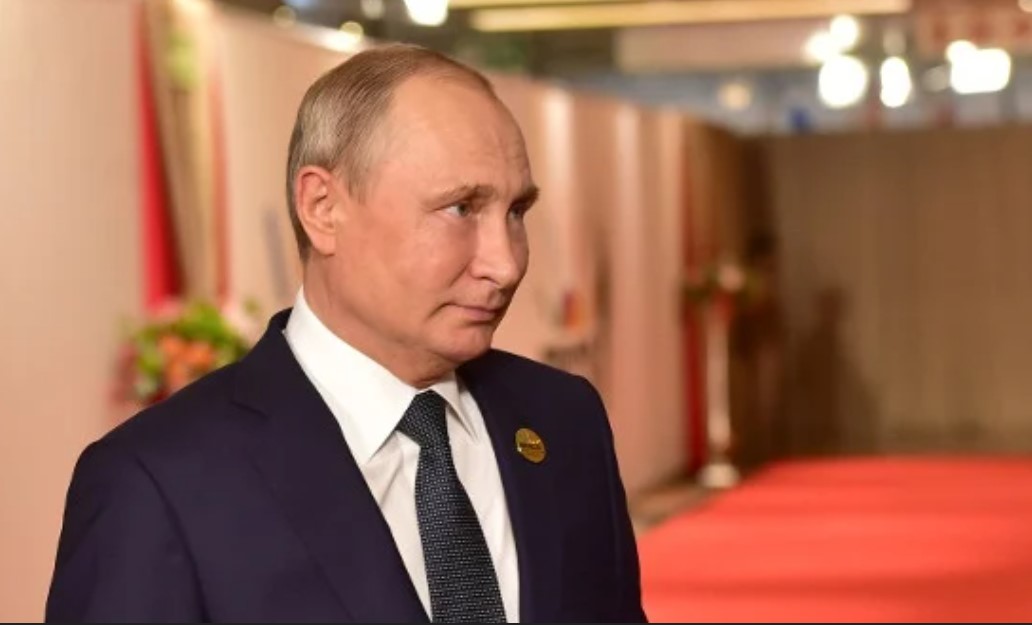News
Filing from Odesa — Between Putin, Pushkin and Potemkin
On Tuesday, 28 June, a crowd in traditional national dress sang folk songs outside Odesa's famous National Opera and Ballet Theatre at lunchtime, in recognition of Ukraine's Constitution Day. By then, there had been no fewer than four air raid warnings that day, the siren wailing through the Baroque streets of this Black Sea port. An earlier raid, at 10am, produced three loud missile strikes, along with anti-aircraft fire.

"South Africa can afford to support Russia,” says Odesa city councillor Piotr Obukhov, “since it knows it's not going to be next.”
Obukhov (37) is an IT entrepreneur who developed the local version of Uber, known as Bond, an example of the tech-savvy younger Ukrainian generations brought up after the demise of the Soviet Union and the realisation of Ukraine's independence in 1991.
“Business is just 30% of what it was before the war,” he says, showing me the administrator's page, detailing business trends and the geographic concentration of lifts. “One of the problems is that people who were likely to afford a taxi to go to work have left Odesa.”
As many as one-third of the city of one million fled the Russian invasion on 24 February, but there is a trickle back as the Ukrainian armed forces hold their own in the region against the Russian advances.
“People forget that the war started in 2014,” says Irina, a waitress at the city's oldest restaurant, opposite the opera house. She came to Odesa from Luhansk in the eastern Donbas. About 150,000 people have moved into the city from areas on the frontline or now under Russian control, including Crimea, just 300km away.
Ukrainian counterattacks around the city of Kherson, about 100km to the east, have pushed the Russians on to the back foot, while the closer port of Mykolaiv continues to resist and remains in Ukrainian hands. Moscow's supposed plan to push westwards from Crimea linking up with Russian-backed separatists in Transnistria in neighbouring Moldova appears to have been abandoned for now, but not completely.
If Russia had been successful in its push from Crimea westwards, Ukraine would have been cut off from its Black Sea ports, and the world from Ukraine's enormous agricultural wealth that feeds 400 million people worldwide, including many in North Africa, the Middle East and especially the Horn of Africa.
Odesa may be the best-known of the Black Sea ports, but it is one of a series of seven public and private terminals that dot the coastline and the giant river estuaries, and works together with those of Yuzhne and Chernomorsk. Together, these three terminals have the capacity for as much as 200 million tonnes of goods annually, concentrating on fuel, fertiliser and ores.
With a ten-year $150-million expansion of its No 35 berth, Odesa alone can handle 25 million tonnes of grain, nearly one-third of Ukraine's annual production. North Africa and the Middle East are particularly important markets — Africa's total production of grains is 120 million tonnes, of which 95 million are corn. Africa imported about 55 million tonnes of wheat last year. Around one-third of this came from Russia, and some 12% from Ukraine.
About 4.5 million tonnes of grain are backed up in Ukraine's Black Sea ports due to the Russian blockade. Calls for opening the sea lanes under international supervision have delivered nothing in the face of Russian obstinance. On the contrary, Moscow has endeavoured to cut off the overland export routes to Moldova and Romania — it has attacked and damaged the rail and road bridge across the Dniester Estuary.
Founded on a Greek trading site, the modern city of Odesa was established by a decree of Empress Catherine the Great. Under Tsar Alexander, Odesa was granted status as a Porto Franco — or free port — in 1819, setting the stage for its cosmopolitan and somewhat louche character. Alexander Pushkin briefly lived in internal exile in Odesa, having offended the powers-that-be in St Petersburg for writing poetry and seducing women, including the governor's wife. He wrote of Odesa as a city where “the air is filled with all Europe, French is spoken and there are European papers and magazines to read”.
The 20th century was comparatively not particularly good for the city. Odesa was, in 1905, the site of a workers' uprising supported by the mutinous crew of the battleship Potemkin, immortalised by Sergei Eisenstein's movie of the same title and (wrongly) commemorated on the great stone staircase leading down to the port. Today, this staircase is, like many important and famous buildings and statues, sandbagged off from public access.
Grigory Potemkin, after whom the battleship was named, built fake portable villages to impress his former lover Catherine the Great during her journey by barge down the Dnieper River to Crimea, through contemporary Ukraine in 1787. These villages would be reassembled further along her route once she had passed to create the illusion of prosperity and organisation, perhaps a metaphor for Putin's military.
At the end of the First World War, Odesa was a centre of fighting between the army of the Ukrainian People's Republic and the Russian White Army on the one side, and the Bolsheviks on the other, ultimately resolved in favour of the latter by 1920.
During the Second World War, the city was badly damaged, under siege for 73 days before its capitulation to Nazi forces in October 1941. About 80% of the Jewish population were murdered or deported, no fewer than 150,000 people. Liberated by the Red Army in April 1944, the city became a key Soviet naval and trading base. Even today, the majority of Odesa's population speaks Russian. And until 24 February, at least, there was a distinct pro-Russian bias in local politics, reflected in opinion surveys.
The invasion changed this, but not entirely.
The city's mayor, Gennady Trukhanov (57), says that while the city was “always known as being Russian oriented, now it's a vice-versa situation”. He trained and served in the Soviet army before getting into politics. He says of the Russians today: “We cannot allow an aggressor in the middle of Europe to conduct their homicide and war.” It's a big step away from his own position before the war, when he campaigned to have some Russian street names returned.

Recent local polls show increasing support for the government and its direction, especially among younger people, despite the increasing economic hardship caused by the war.
City councillor Obukhov stood for mayor in the last election, coming third with 12%. He represented the European Solidarity Party, which as the name suggests, favours closer integration.
He speaks of ambitious plans for post-war Odesa, including pedestrian walkways to complement the café culture, more sensitive housing development, electronic ticketing for public transport and investment in cycling lanes.
As we drank coffee on the porch of the nearly-deserted hotel looking out over the Black Sea, the air raid sirens went off again, the missiles usually being directed from Crimea, the Black Sea fleet, and sometimes from marauding Russian aircraft. Earlier the same day, a missile strike on a shopping mall in the central Ukrainian city of Kremenchuk left at least 20 dead and perhaps hundreds injured.
Victory for Ukraine will require Russia's offensive military capability to be defeated on the anvil of Ukrainian patriotism and youth with Western weapons and money.
“The economics of sanctions and of military losses can only hurt,” notes Obukhov. If Ukrainian claims of the loss of 400 Russian aircraft and almost as many pilots and 1,500 tanks are even half true, the replacement cost is crippling, not to mention the burn rate on ammunition, people and missiles. And when it reaches a tipping point, hopefully, diplomats will be able to craft an acceptable and durable peace.
“We will rebuild,” says Piotr. But first, the war has to end.
This article originally appeared on the Daily Maverick


